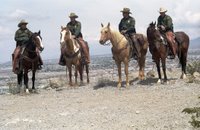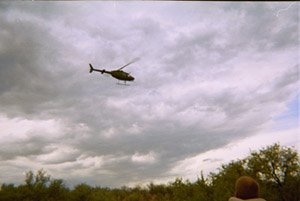
Out of the muck of simplistic analyses and black-and-white reactionism over immigration, a small jewel of a documentary has grown that lets various sides voice themselves and still drills down to the catalysts underlying the actions of various players.
El inmigrante, a film by John Sheedy and brothers John and David Eckenrode, centers on the murder of undocumented Mexican migrant Eusebio de Haro by Bracketville, Texas, resident Sam Blackwood in 2000. It illuminates this case of injustice well, but it also uses the incident as a launching pad for an investigation of broader issues, simply by letting people of varying opinions speak.
El inmigrante opens with an absolutely beautiful shot of ranchera musicians, playing, silhouetted against an evening sky. Then the camera pans to a few white-painted wooden crosses that commemorate Mexican migrants who have died during their sojourns.
The film hops from interview to interview with figures on various sides of the debate, slowly building from general commentary on illegal-immigration issues into the story of the 23-year-old, murdered Mexican.

Viewers hear from people like Neil Slozar and Joe Segura of the El Paso Border Patrol, Kinney County Sheriff Buddy Burgess, Bracketville Councilwoman Mary Flores, Bracketville News editor Jewel Robinson, Cindy Kolb of Civil Homeland Defense, and Chris Simcox, President of the Minuteman Civil Defense Corps, the last two of whom have stationed themselves in the Arizona borderlands.
The film crew also traveled to San Felipe de Torres Mochas, a town deep into Mexico and the home of the de Haro family. There, viewers meet Eusebio’s parents, Paciano and Mercedes, and his seemingly endless stream of brothers and sisters, eventually focusing on Diego, apparently the next-eldest son of the family, who tells great stories about the boys’ adolescent mischief.
El inmigrante then jumps the border back to Bracketville to hear friends and acquaintances of Sam Blackwood and his wife, Brenda, speak about them. Back in San Felipe, we hear that Eusebio had set off in search of “el típico sueño americano”, and arrived in Terro, Texas, where he found counstruction work. But he ended up deported to Nuevo Laredo, Mexico, in May of 2000, his young daughter and her mother still in Texas. He then tried to re-enter the country in the company of a young man named Javier Javier Sanchez. The details of the re-entry and the murder come from Javier’s video-taped testimony and related details from local Sheriff Burgess, the first to arrive on the scene, and Diego. (It’s not clear where Diego got his information.)
The story comes out as follows: Eusebio and Javier swam the Rio Grande to cross into Texas, subsisting on soda and chips. After some time walking and finding themselves out of supplies, with no town in sight, the young men came across the Blackwoods’ home and knocked on the door. When they asked Mrs. Blackwood -- in English -- for water, she turned them down, telling them she was sure they would rob her. They then heard her tell someone inside to call the Border Patrol. The young men left and continued on their way. A few minutes down the road, a car approached them. Sam, 74, emerged from the vehicle and started shooting at Eusebio and Javier with a pistol. The young men turned and tried to run, but Sam hit Eusebio in the back of the leg, the bullet, a particular type of practice ammunition, tearing an even larger exit wound in the front of his leg. Javier hesitated and then kept running. Brenda approached Eusebio and told him to use his fingers to stop up the wound. Sam stayed where he was -- about 100 feet from the bleeding Eusebio, who asked Sam, “What did you do that for?” Blackwood lit his pipe and had a smoke.
Sheriff Burgess arrived in time to see Eusebio take his last breaths, as the Blackwoods stood, watching. Blackwood later claimed self defense, but the medical examiner said that Eusebio’s having been shot from behind from such a distance made that impossible. Sam faced a grand jury for an indictment of aggravated assault with a deadly weapon, according to Burgess, but the “deadly weapon” part somehow got dropped. That moved the trial from the federal level to a local county courthouse where Blackwood was found guilty and sentenced to two years probation. For murder.

“Lastimadamente,” said Eusebio’s uncle, Jorge de Haro, “la historia de los inmigrantes es así.” (Unfortunately, this what the history of immigrants is like.)
The call about the murder hit Eusebio’s family hard, but the verdict made things worse. “Son racistas,” said Paciano; they’re racist for not applying the law fairly.
Diego was so devastated that he fled to the USA “para distraerme”, to distract himself. He endured days waiting on the banks of the river for his transport across and, once on the other side, walked 38 hours non-stop to reach safety -- in a tiny room and a construction job where he has but one friend.
But Paciano and Mercedes seem sadly devastated rather than enraged.
“No le deseamos mal,” Paciano said of Blackwood. (We don’t wish him harm.)
“No lo juzgamos,” added Mercedes. (We don’t condemn him.)
Mostly they talked about the sadness of losing their son and how it has changed their lives.
“Hay un vacío, y nadie lo llena,” said Paciano. (There’s a void, and no one fills it.)
Paciano appears a sensitive and philosophical soul, as he gently and sometimes tearfully expounds on the unending cycle of violence between Mexicans and residents of the USA, and he highlights the injustice of the situation.
“¿Qué pasaría si los mexicanos tuvieron esa fuerza que tiene los Estados Unidos? ¿Qué pasaría si los que emigraron fueron de alla para acá y les hicerian daño? ¿Que se sentía? Se siente mal. Se siente feo.”
(What would happen if the Mexicans had the power that the USA has? What would happen if those who emigrated went from there to here and people hurt them? How would it feel? It feels bad. It feels ugly.)
Diego echoes these sentiments from the USA: “Un americano pasa por México como en su casa. ¿Y los mexicanos no pueden pasar así [en los EEUU]?” (A person from the USA goes around Mexico like he’s in his own house. And Mexicans can’t do that in the USA?)
Mary Flores makes a similar point, putting words into the mouths of anti-immigration folks: “You come onto my land; I kill you. But I can come into yours.” The filmmakers lay these words over footage of a couple of preppie blonde guys leaving the famed, tourist bar Señor Frog’s, presumably in Tijuana.
We see a de Haro family picnic in a field and hear about Eusebio, the joy he brought his parents, “las buenas memorias”, which are all they have left of him.
Then back to Simcox and company who make rather militant and aggressive remarks, especially when juxtaposed with the words of the de Haros. And this distinction, made by the participants themselves by the words they speak, forms the pinnacle benefit of
El inmigrante. Seeing the chasm between respect for the dignity of life by some -- including among the members of the Border Patrol and Sheriff Burgess -- and the fearful if not hateful aggression on the part of the vigilantes and some of the Bracketville residents, illuminates the most dire, life-and-death facets of the political debate over immigration to the USA, the faces of those living the effects of politics. For instance:
Simcox, interviewed while on patrol with an AK-47, uses the catch-phrase “rule of law” and demands that the President deploy “the National Guard and the military under Homeland Security and...line that border with a civilian-type, military, police force.”
Sheriff Burgess: “Putting the army on the border would just cause problems.”
_____
Roger Burnett, rancher: “The white race is gonna be gone” if immigration keeps up like this.
Diego de Haro: “Todos somos humanos. Todos somos iguales.” (We’re all human beings. We’re all equal.)
_____

Kolb, who also goes armed: “We don’t know what’s coming across this border. Could be weapons of mass destruction, disease, poverty.”
Segura, Border Patrol: “Ninety percent of border crossers are just regular people, looking for work.”
_____
Kolb: “If people from other countries know that they’re gonna be shot if they cross that fence, then they’re not gonna cross that fence.... [T]hey’re all illegals, and they’re all equally guilty.”
Slozar, BP: “Just because you’re not an American citizen doesn’t mean you don’t have the same rights someone else has.”
_____
Burnett: “We should send [each immigrant] back [to Mexico] with an AK-47 and a box of shells. And that way they can take over their government and make it better.”
Paciano: “Nunca vamos a parar. ¿Qué hay de hacer? Pues pensarle un poquito y acabar con la agresión, acabar con todo y mirarlos como gente, gente humana, gente que sabemos pensar.”
(Our cycle of violence won’t stop. What can we do? Well, we have to think a little and stop the aggression, stop everything and see each other as people, human beings, people who know how to think.)
And the film leaves us here, with pleasant scenes of the de Haros' family life, a picnic, the handmade fireworks that are the family business sparkling in the evening sky, life struggling to move forward, scarred by the past and prepared to hope for the future, human, while militant forces mass on the other side of the border. Justice may stumble, but
El inmigrante does not.
Technorati tags: Immigration,
Politics,
Border,
Simcox,
inmigrante.





